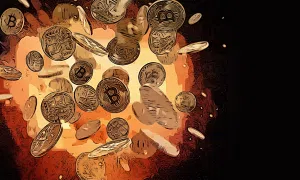The collapse of FTX was even bigger and affected the crypto world even more than the Terra\LUNA fall. This stablecoin operator went bankrupt last spring and dragged Voyager, Celsius, and 3AC down with it.
The main lesson of this event is that FTX once again proved that the crypto industry is still based on trust. And corruption doesn’t go anywhere.
But that’s not all. Let’s dig a little deeper.
Not DeFi but a fraud
Stratechery analyst Ben Thompson thinks FTX originally had little to do with real decentralized finance (DeFi) and was a fraud (in one sense or another).
The brand new newsletter with insights, market analysis and daily opportunities.
Let’s grow together!
“The FTX case is not, technically speaking, about cryptocurrency utility; it is a pretty straightforward case of fraud. Moreover, it was, as I noted in passing in that OpenSea article, a problem of centralization, as opposed to true DeFi. Such disclaimers do, though, have a whiff of “communism just hasn’t been done properly”: I already made the case that centralization is an inevitability at scale, and in terms of utility, that’s the entire problem. An entire financial ecosystem with a void in terms of underlying assets may not be fraud in a legal sense, but it sure seems fraudulent in terms of intrinsic value. I am disappointed in myself for not saying so before,” he wrote.
Despite questions about Alameda’s relationship with FTX, even seasoned investors trusted Samuel Bankman-Fried (SBF), investing billions and promoting his platform among small investors. Now they are facing a lawsuit from defrauded people. Several celebrities, including comedian Larry David, National Football League quarterback Tom Brady, tennis star Naomi Osaka, and the Golden State Warriors basketball team, are also demanding answers.
10 important lessons to remember
Crypto analyst Miles Deutscher has listed valuable insights from the SBF collapse. And here they are:
Don’t just HODL
Reassess your savings on a regular basis. Review your portfolio at least once a month and ask yourself why you are holding this token, and would you buy it now?
If in doubt, get rid of unreliable coins. Remember that holding a token is the same as buying it at the moment (opportunity cost).
There is nothing that can’t fail
In the example of LUNA (and now FTX), even the biggest players can fall. Don’t let someone else’s overconfidence affect your beliefs. So trust numbers and research more than other people’s tweets.
Avoid unnecessary risk
There is no smoke without fire. If there is even the slightest rumor that an exchange is going bankrupt, always withdraw your funds. It’s better than risking losing all your tokens.
Initially, take FUD (Fear, Uncertainty, Doubt.) as truth and try to refute it, not dismiss it because of prejudice.
No keys, no coins
Store your cryptocurrencies on Ledger/Trezor cold wallets (by the way, many have done so). You can trade on CEX — but withdraw your profits as soon as possible.
Start trading on DEX
If you want to completely avoid the risk of centralized exchanges (CEX), consider DEX.
There are great places to trade derivatives such as GMX, GNS, APEX, etc.
Be aware of the implications
Whenever an event like a “black swan” (A theory that considers hard-to-predict and rare events that have significant consequences.) occurs, think deeply about its implications for the tokens associated with it and the industry as a whole.
Each collapse has positive implications for certain sectors/narratives. For example, the DeFi trade volume is booming right now.
Act quickly
When FTX started to collapse, there was a huge opportunity to profit by shorting affected tokens (FTT).
If another such event occurs, don’t sit on the sidelines. Trade pragmatically based on the information available.
Always look for vulnerabilities
Too often we look at the positives when researching a token or project: FTX is a big exchange, SBF is very smart.
Instead, ask the tough questions first and then look for the positives versus the weaknesses.
Demand transparency
If a project avoids stating where its balance sheet/treasury is, that’s a red flag. In centralized exchange (CEX), always look for evidence of reserves/treasuries. In DeFi — look for evidence of treasury reserves.
Always have cash
Always leave some cash to take advantage of new opportunities that may arise in the market. Those who have done so can now accumulate funds at bargain prices.
How can I make money on this?
By filing FTX for Article 11 bankruptcy, there is a chance there will be a refund. But not anytime soon. Only after the crypto exchange pays its legal fees and debts to creditors. And that’s if the company has anything left.
1/ Statement from John Ray, Chief Restructuring Officer and CEO of @FTX_Official — Consistent with their obligations as Chapter 11 Debtors-in-Possession, FTX US and FTX [dot] com continue to make every effort to secure all assets, wherever located.
— Ryne Miller (@_Ryne_Miller) November 12, 2022
FTX US withdrawals:
ETH withdrawals will resume shortly, our apologies on the delayMatic – if you would like to withdraw Matic please cancel your withdrawal and request it as erc20 Matic
— FTX (@FTX_Official) November 11, 2022






